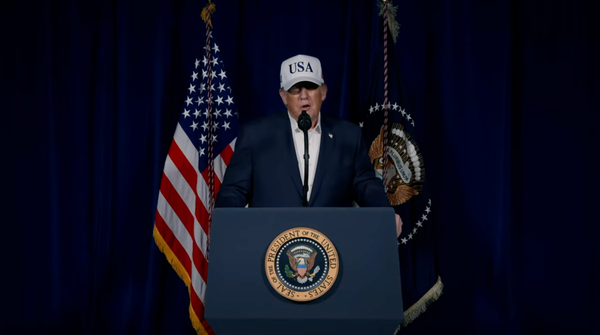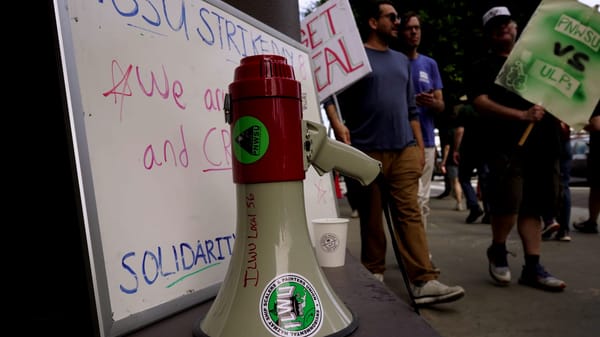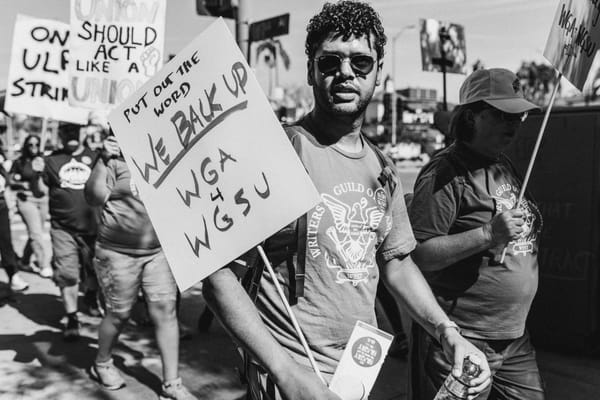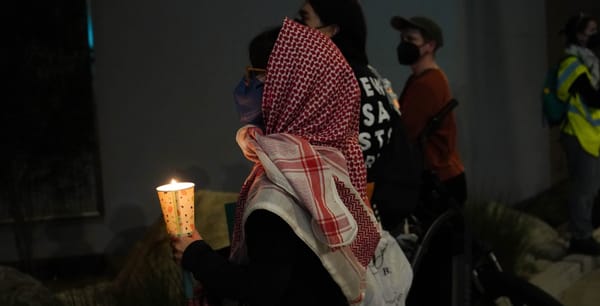Last Week in Labor: January 19-25, 2025.
Unions respond to Trump Admin EOs, Starbucks organizing continues apace, and more headlines you may have missed.
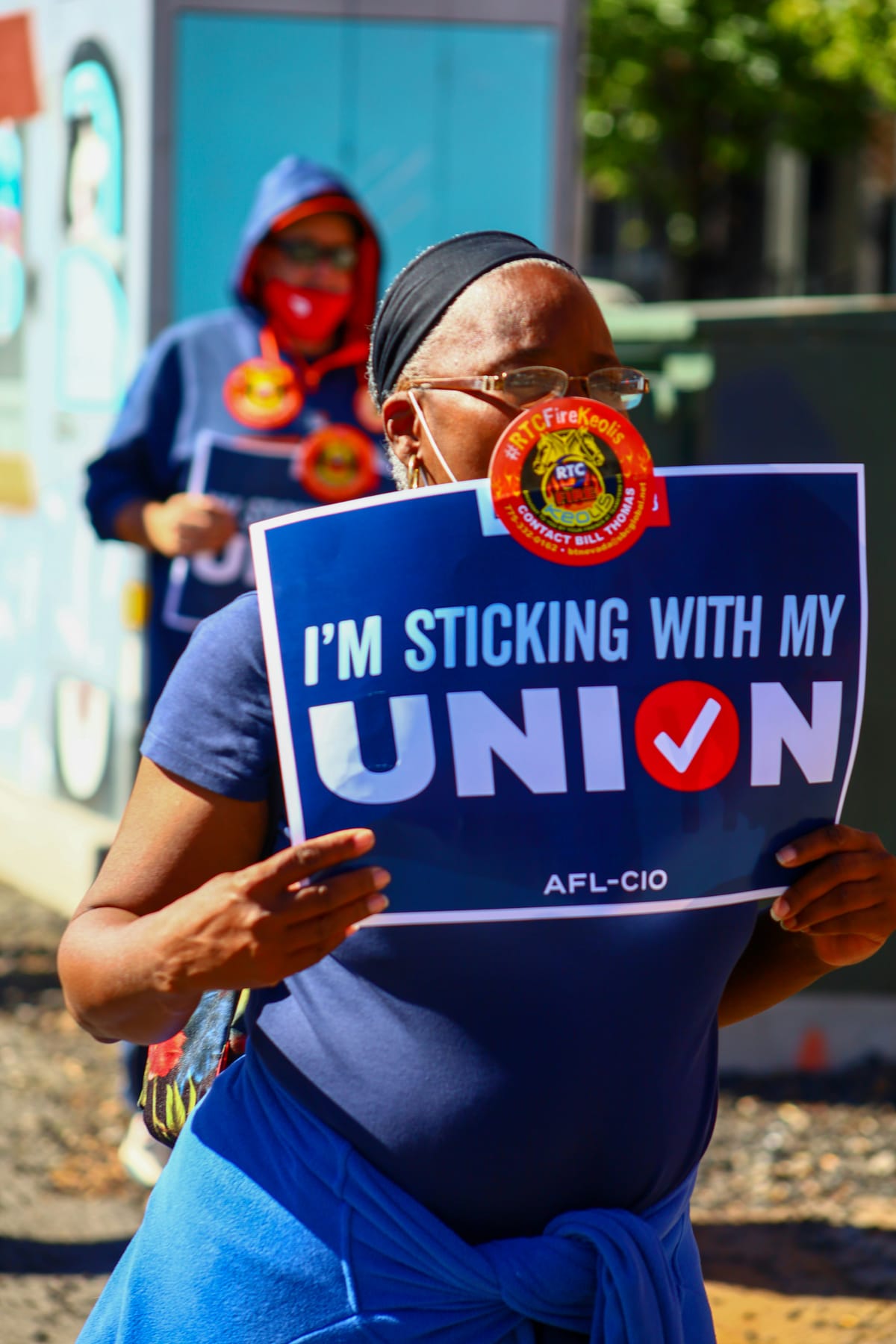
Welcome back, my friends, to the weekly labor digest.
After the last couple weeks of marathon reporting on my end, I'm getting a slow start back into the digest. Note: This week's digest is quite shorter than usual. Rest assured, a full digest will be in your inboxes next Monday.
Gonna start off the newsletter with the usual breakdown of headlines that you might have missed during a whirlwind news week, and then break up the commentary and analysis section to include specific statements regarding this new Trump administration-- there are a number of them that are worth taking a look at.
U.S. Labor News
UM-Health Sparrow, nurses reach contract agreement
Manhattan School of Music Faculty Rally for a Fair Contract
On Jan 24, the Precollege Division faculty of the Manhattan School of Music and supporters rallied outside of the school to demand a fair contract.
Faculty are seeking wage increases to bring pay rates more in line with industry standards after years of making barely ½ of what peer institutions offer. Outrage among faculty has boiled over as the School’s public-facing financials reveal an easy ability to afford the proposed increases, high profit margins, and impressive compensation packages for senior administrators. As a result the union voted overwhelmingly on Jan. 8 to authorize a strike—the first in the school’s history of over 100 years.
Stellantis announces investments after disputes with UAW
Democracy Works staffers approve first labor contract with News Media Guild
Workers at nonpartisan voter education organization Democracy Works ratified their first labor contract with the News Media Guild on Thursday. Democracy Works creates comprehensive guidance regarding all aspects of U.S. elections, and millions of U.S. voters rely on their work to stay informed ahead of elections.
The pact, ratified Thursday, guarantees yearly pay raises, establishes job security, and secures other important workplace rights at the leading civic technology nonprofit organization.
The contract offers workplace protections for the next three years to 34 employees across several departments, including engineering, research, partnerships, and more. The agreement was reached after nearly three years of collective bargaining efforts.
‘No better than working at 7-Eleven’: Unions oppose bill to end collective bargaining for Utah public employees
From the Salt Lake Tribune,
The head of Utah’s largest teachers’ union is warning that a bill proposed in the Utah Legislature could hurt public workers — teachers, law enforcement, firefighters, public transit drivers and more — and the people they serve.
“The bill is silencing our voice in terms of trying to improve working conditions, and those working conditions are our students’ learning conditions,” Renée Pinkney, president of the Utah Education Association, said Tuesday, the opening day of the 2025 legislative session.
The bill, HB267, is aimed at banning collective bargaining across all of Utah’s public sectors. The bill would not prevent public employees from joining or forming unions, but it would prohibit government employers from “recognizing a labor organization as a bargaining agent.”
Unions Respond to Trump Inauguration and Executive Orders
Editor's note: this list is not exhaustive, and will be updated in subsequent digests.
Statement from the Chicago Teachers Union on Trump's Policy Threatening Schools
On Jan 21, CTU released a statement in the wake of Trump's inauguration reaffirming their policy of not working with ICE, and calling upon Chicago Public Schools CEO Pedro Martinez to continue ensuring that CPS schools remain a safe learning environment for students and staff.
Today, the Chicago Public Schools are staring down a real threat. According to reporting from various sources, our newly-minted U.S. President has decided to make the City of Chicago the opening scene for his mass deportation horror film —an attempt to use the power of the White House to rip apart families, disrupt communities and potentially try to violate the safest places in our neighborhoods, public schools.
A couple of years ago, the CTU fought for and won sanctuary policies at CPS to make sure our students can learn in a safe environment regardless of their immigration status. Because of our last contract, there are protocols to prevent ICE officers from having free access to our school buildings, to activate legal responses, and to protect our students’ rights—we need our CEO to enforce our contract with implementation and training protocols that help keep our students and their families safe.
AAUP Opposes 'Anticipatory Obedience' to Trump, GOP
The American Association of University Professors released a statement Thursday called 'Against Anticipatory Obedience.' The statement urged universities to not comply in advance to any Trump directives. Here's a good IHE piece with some extra context, and you can find the full statement here.
As Donald Trump assumes the presidency for a second time, the outlook for higher education is dire. The new administration’s agenda for higher education has been thoroughly prepared by a series of statewide legal assaults on public colleges and universities in North Carolina, Florida, Texas, and elsewhere, as well as by the high-profile congressional witch hunt that within the past year brought down the presidents of three Ivy League institutions.
How should we respond? The University of Chicago’s 1967 Kalven Report, often cited as the source of calls for “institutional neutrality,” declares, “From time to time instances will arise in which the society, or segments of it, threaten the very mission of the university and its values of free inquiry. In such a crisis, it becomes the obligation of the university as an institution to oppose such measures and actively to defend its interests and its values.” This is undoubtedly such a time.
AFL-CIO President Liz Shuler: ‘Trump’s Attack on Federal Workers Has Begun’
From the press release: "AFL-CIO President Liz Shuler released the following statement in response to President Trump’s reinstatement of Schedule F, which Trump created in his first term, that seeks to reclassify hundreds of thousands of federal employees so they can later be fired and replaced with political loyalists"
Let’s be clear about who these federal workers are that Trump wants to be able to remove without due process. They are the people who care for our veterans at Veterans Affairs centers, make sure our families get their Social Security retirement and disability checks, protect our airports and passengers, inspect our food to ensure it’s safe to eat, and help survivors of disasters—like the North Carolina floods or California fires—get the support they need to rebuild. 85% of them live outside our nation’s capital in towns and cities across every state in the country. Federal workers are our co-workers, friends and neighbors.
The federal government’s failure to function with a skeleton crew of political cronies will have wide-ranging, life-changing consequences for hardworking Americans. Without skilled and experienced federal workers, Americans’ basic, fundamental needs are at risk.
Commentary and Analysis
Unions To Face Hurdles Organizing Under Trump NLRB
Law360 has a fantastic analysis of what Trump's NLRB might look like. Read the full piece here.
President Donald Trump's return to the White House will likely usher in a more difficult organizing climate for labor unions, and experts said the coming changes could particularly complicate organizing in academia and industries with many low-wage workers.
(Editor's note: It's worth a sign-up to read their newsletters, especially if you want to stay up to date on the flurry of legal decisions that are coming down the pike in the future. They offer a free trial option, and then you can choose to pay for a subscription if you'd like.)
Union Members Run Down GOOD OPPORTUNITIES for Pro Worker Legislation in Alabama
What Can The US Labor Movement Do To Build On Its 2024 Victories?
From CleanTechnica,
With the recent election upheaval in the US government, it’s important to remember that the labor movement flourished in 2024. Workers across sectors and interests challenged wage ceilings, sought job safety and security, and looked to unions to represent their collective interests.
The ascendance of Donald J. Trump to the executive office, however, could jeopardize worker gains. The labor movement must play a major role in sustaining worker rights, and all indications are that union organizers are preparing to fight back by compelling working and young people to participate in protests, occupations, and walkouts.
The need for collaborative solutions is pressing — and the stakes are high for the US labor movement.
Boss Watch | Florida Worker KILLED Due to Boss Negligence
Labor by the Numbers
Last week, there were 39 filings for representation with the NLRB. Here are a few worth taking a look at:
- 10 FT/PT mechanics and parts people at Transdev Services, Inc., filed for representation with the Teamsters, Local 665 in Santa Rosa, CA.
- 4 new Starbucks stores filed for representation in various states across the country.
- 33 FT/PT non-supervisory employees at Siletz Valley School in Siletz, OR filed for representation with the Oregon School Employees Association, AFT Local 6732.
Looking Ahead...
The transition of power to the new administration will likely affect things in the future. As things change, there are a number of us working diligently on keeping track of the outlook for organizing. I'll likely be renaming this last section to something more appropriate, and bring in reporters and analysts who are keeping track.
I will likely be adding more info to the Labor by the Numbers section as well, including additional reporting on ULPs and other cases, as well as including more reporting from Matt Bruenig's incredible newsletter, NLRB Edge.
Stay tuned.
Alright, that's it for this week, folks. I hope you're hanging in there as we enter in a new era in this country. As I always say, the only way out is through, together.
Love and solidarity from me,
Mel


